Immersive sound formats Dolby Atmos and DTS:X allow us to experience music and movies at home in a new way. Sound can come from not just all around you but above you as well. Rain will sound so real you’ll be reaching for an umbrella. A helicopter landing will make you duck. And your favorite singer may just whisper a little something into your ear.
When it was first released for home use, Dolby Atmos immersive surround was only available in expensive processors and receivers. And you needed some serious A/V smarts to put together a system with all the necessary components and speakers. Oh yes. The speakers. Lots and LOTS of speakers.
The minimum number of speakers required for a Dolby Atmos system is eight: five speakers at or near ear height to provide the traditional surround sound stage, a powered subwoofer for low bass reproduction and two height speakers to reproduce sound from above.
This is known as a 5.1.2-channel system. But a more elaborate immersive surround system can include fifteen or more speakers. A speaker ask that large rarely makes it past the significant other. And the “beg forgiveness” approach may end up with the buyer sleeping in the proverbial dog house (don’t ask me how I know).
Today, many companies are offering fully integrated soundbar systems that can reproduce the Dolby Atmos immersive experience at home with fewer components, fewer speakers, and a lot less technical expertise required. If you want that multi-dimensional sonic experience at home, without the complexity of a full component-based surround system, here are a few great-sounding Dolby Atmos soundbars that get our recommendation in 2022.
Please Note: this site is reader-supported. Purchases made using our links may earn us a commission.
SONOS ARC/ARC SL
The SONOS ARC (and its microphone-free twin the ARC SL) include upward-facing speakers built into the bar to handle the height channels for Dolby Atmos. So you’ve got your front left, center and right channels, plus your two height speakers in that one sleek bar.
The Sonos ARC does include side-firing drivers as well, for a slightly more enveloping sound. But for a truly immersive 5.1.2 Dolby Atmos system, we recommend adding a pair of Sonos One SL speakers for the rear channels. They are wireless but do require access to power so keep that in mind. You’ll need to add a Sonos Sub as well, if you want extended bass frequencies. The Sub is also wireless, but needs electricity to do anything so make sure you have a place to plug it in.

The main benefit to a Sonos soundbar (other than its high quality sound) is that it brings with it the Sonos multi-room whole home music platform. This is currently one of the best and simplest ways of bringing music to any room in your house without a complicated control system or in-wall wiring. If you already own Sonos, you know how easy it is to listen to music anywhere in your home using the app. Sonos ARC in your living room, a pair of Play Ones in the bedroom and a Sonos Roam in the shower: presto: Music Everywhere!

Another benefit with Sonos soundbars is that they are currently the only speaker systems that support Dolby Atmos in Amazon Music (as of October, 2022). And if you’re a music lover who hasn’t checked out Dolby Atmos music yet, you’re in for a treat. If you add in an Apple TV 4K streaming box to your TV, you’ll be able to listen to Dolby Atmos Music from all three music services that support it: Amazon Music, Apple Music and Tidal. In a recent firmware update Sonos finally added support for DTS to the ARC, but only in its compressed form. DTS:X and lossless DTS:HD Master Audio are not yet supported on Sonos products.
The main drawback of the Sonos system is the price. A full 5.1.2 channel Sonos System using the ARC currently sells for over $2,000. The ARC also only includes a single HDMI input, so you’ll need to plug any of your sources (streaming stick, cable box, Blu-ray player) into your TV and run the HDMI cable from the TV to the sound bar.
The only difference between the Sonos ARC and the ARC SL is that the “SL” version lacks a built-in microphone. If you don’t need the ability to control music with your voice (and you’re not interested in using Amazon Alexa or the Google Assistant on the bar) then you can go with the SL version for about $50 less. The ARC SL is currently exclusive to Costco but the standard ARC is widely available online and in stores.

Sonos offers a smaller and less powerful soundbar which also supports Dolby Atmos: the Sonos Beam, Gen 2. The Beam sells for $449 on its own, but you’ll still need a Sonos subwoofer and a pair of One SL speakers to complete the 5.1.2 set-up.
Note: Beware of 3rd party Amazon sellers with inflated prices on Sonos products. The list price of the ARC is $899, the Sub is $749 and the One SL is $199 each. Don’t pay more. Sonos-authorized retailer Crutchfield currently has a package price on the Sonos Arc 5.1.2 system for under $2000 (less than the regular retail price of the individual components). See links below.
Where to Buy Sonos Arc:
- Sonos ARC soundbar – Amazon, Crutchfield
- Sonos Sub subwoofer – Amazon, Crutchfield
- Sonos Sub mini subwoofer (smaller, cheaper sub for smaller spaces) – Crutchfield
- Sonos One SL (for rear channels – you’ll need 2) – Crutchfield
- Sonos ARC 5.1.2 System Bundle with ARC, Sub and 2 x One SL (Crutchfield)
Samsung HW-Q900A Dolby Atmos Soundbar
Although Samsung may be best known for their TVs and Galaxy phones, they also make soundbars, and fine-sounding ones at that. A few years ago they acquired a little company called Harman International (makers of Harman Kardon gear), and that company knows a thing or two about good sound. Harman and Samsung engineers and designers collaborate in the company’s sound lab in California to create and tune Samsung’s audio products, including sound bars.

In addition to sounding quite nice, the Samsung HW-Q900A Dolby Atmos soundbar actually includes all the speakers needed for Dolby Atmos – front speakers, surround speakers and height speakers – in a single sound bar. To get sound from above and behind or beside you, the HW-Q900A includes both upward-firing and multiple side-firing speakers which bounce sound off the ceiling and the side walls. For this to work well, you need a regular box-shaped room with smooth side walls and a smooth ceiling to reflect the sound. The HW-Q900A includes a powered subwoofer in the box as well, so you’ll get that low bass extension and impact from music and movies without an additional purchase.

If your particular room doesn’t work well with wall-bouncing speakers, or you just feel the need for more surround in your sound, you can pick up a compatible pair of wireless rear speakers, the SAMSUNG SWA-9500S Rear Speaker Kit. The 9500S rear speakers include both top-firing and front-firing drivers for a completely immersive experience. The rear speakers are wireless so you won’t need to run speaker wires from the front to the back of the room. They do need power, however, so make sure you have a power outlet or power strip available in the back of the room.
Samsung calls the HW-Q900A a “7.1.2 system” and they say it expands to “9.1.4” with the rear speaker kit added. Since much of the sound is reflected, I don’t know if I’d go so far as to call it a discrete 9.1.4 channel system, but it definitely creates a seamless immersive surround experience, from front to back and top to bottom, even in larger rooms. In addition to Dolby Atmos, the Samsung soundbar also supports DTS:X immersive surround. The HW-Q900A offers two HDMI inputs plus an eARC-compatible HDMI output that can carry video signals to your TV while also receiving the audio signal back from your TV.
The HW-Q900 list price is $1299.99 but it usually sells for under $900 online The 9500S rear speaker upgrade kit sells for about $300. The HW-Q900 was introduced in 2021 but is still current and available. There are newer Samsung soundbar models, just released in 2022, but initial user reactions to these models has been mixed and we have not had a chance to test them yet so we are not recommending those models (yet). Need more information? Check our our own Robert Silva’s review of the Samsung HW-Q900.
Where to Buy Samsung HW-Q900 Soundbar and Optional Rear Speakers
- Samsung HW-Q900 Soundbar (Amazon)
- Samsung 9500S Rear Speaker Kit for HW-Q900 (Amazon)
Vizio Elevate 5.1.4 Dolby Atmos Soundbar System
If you want a complete Dolby Atmos soundbar system which includes the rear speakers and subwoofer at a fairly affordable price, the Vizio Elevate 5.1.4 (Model P514A-H6) is worth a look and a listen. The sound bar has upward-facing speakers for the height channels, and you’ll find both a powered subwoofer and rear channel speakers in the box. The rear channel speakers also include upward-firing drivers so this gives you a 5.1.4 channel configuration. The Vizio Elevate soundbar offers two HDMI inputs plus an eARC HDMI output that can carry video signals to your TV while also receiving the audio signal back from your TV.

In a nifty (but also practical) gimmick, the height speakers at the outer edges of the Vizio Elevate sound bar rotate upwards automatically to bounce sound from the ceiling when you play back content in Dolby Atmos. The Vizio Elevate also supports DTS:X immersive surround. The VIZIO Elevate 5.1.4 channel sound bar system has a list price of $999, but currently sells online for a bit less.
Where to Buy VIZIO Elevate 5.1.4-Channel Sound Bar System:
We are keeping our eyes (and ears) peeled for new Dolby Atmos compatible sound bar systems to recommend. So stay tuned. And if you’re interested in taking the plunge with a component-based Dolby Atmos home theater system with receiver and speakers, check out our recommendation for Best Budget Dolby Atmos Home Theater System. Just make sure your dog house has plenty of room for speakers.
Related Articles:



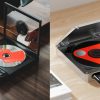



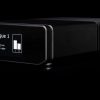
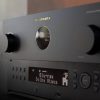
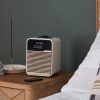

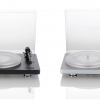
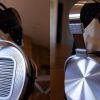






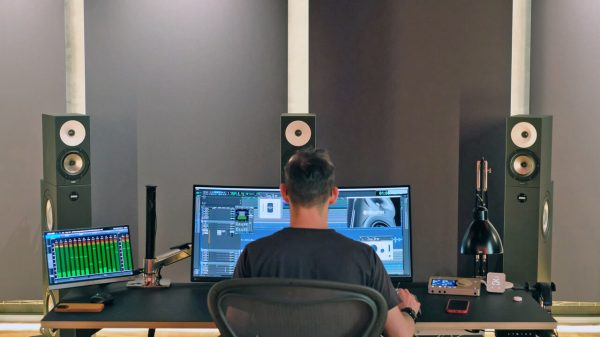
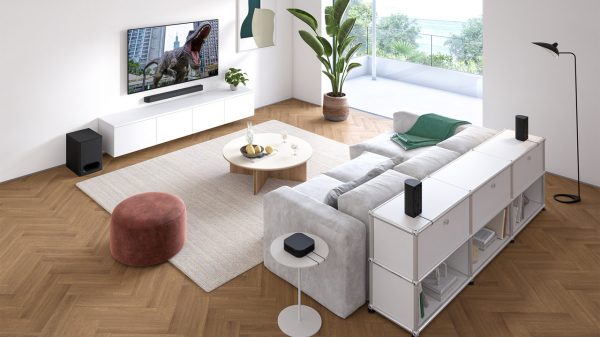
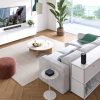




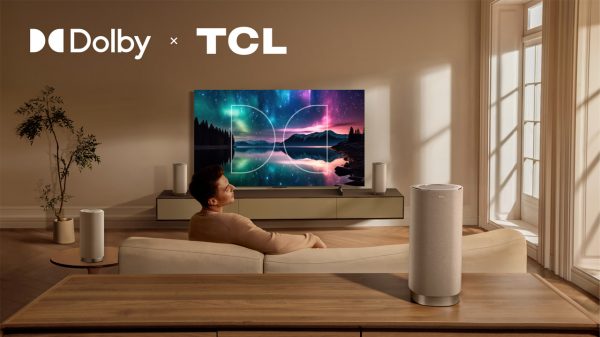
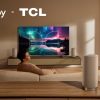

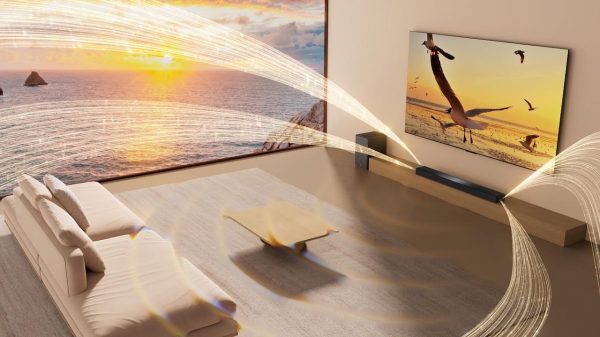













Richard Pontone
October 26, 2022 at 7:36 pm
Nice article.
FYI.
Costco has a holiday sale from Oct. 31 to Nov. 13, 2022 for the Samsung HW-Q67CB/ZA 5.1 channel Sound bar with Dolby Atmos for $229.99 after $250 mark off. Limit 3. Looks like 3 speakers and a Subwoofer.
Good deal for the price?
Chris Boylan
June 1, 2023 at 1:11 am
Seeing this late but the system you’re referring to uses virtualization for the height channels. In other words, it uses electronic processing to simulate the effect of sound coming from above the listener. We prefer sound bars that use reflective speakers that bounce height sound off the ceiling so that height sounds actually come from above the listening position. I’m sure that Samsung soundbar sounds good for the price but you’d be getting a somewhat diminished Dolby Atmos experience from it.
Jeff
April 3, 2023 at 7:48 am
JBL 1000 and Nakamichi Dragon are 2 sound bar are 2 sound bar that impressed me
Chris Boylan
June 1, 2023 at 1:12 am
That Nakamichi Dragon looks like complete overkill. I like it! I may look into getting a review sample of it.